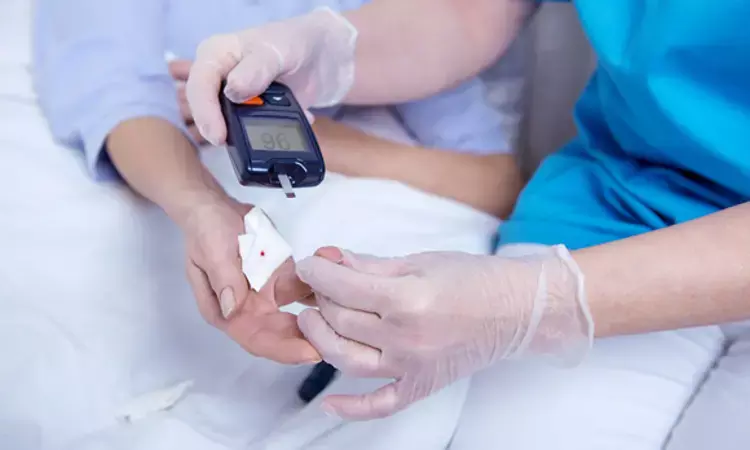- Home
- Medical news & Guidelines
- Anesthesiology
- Cardiology and CTVS
- Critical Care
- Dentistry
- Dermatology
- Diabetes and Endocrinology
- ENT
- Gastroenterology
- Medicine
- Nephrology
- Neurology
- Obstretics-Gynaecology
- Oncology
- Ophthalmology
- Orthopaedics
- Pediatrics-Neonatology
- Psychiatry
- Pulmonology
- Radiology
- Surgery
- Urology
- Laboratory Medicine
- Diet
- Nursing
- Paramedical
- Physiotherapy
- Health news
- Fact Check
- Bone Health Fact Check
- Brain Health Fact Check
- Cancer Related Fact Check
- Child Care Fact Check
- Dental and oral health fact check
- Diabetes and metabolic health fact check
- Diet and Nutrition Fact Check
- Eye and ENT Care Fact Check
- Fitness fact check
- Gut health fact check
- Heart health fact check
- Kidney health fact check
- Medical education fact check
- Men's health fact check
- Respiratory fact check
- Skin and hair care fact check
- Vaccine and Immunization fact check
- Women's health fact check
- AYUSH
- State News
- Andaman and Nicobar Islands
- Andhra Pradesh
- Arunachal Pradesh
- Assam
- Bihar
- Chandigarh
- Chattisgarh
- Dadra and Nagar Haveli
- Daman and Diu
- Delhi
- Goa
- Gujarat
- Haryana
- Himachal Pradesh
- Jammu & Kashmir
- Jharkhand
- Karnataka
- Kerala
- Ladakh
- Lakshadweep
- Madhya Pradesh
- Maharashtra
- Manipur
- Meghalaya
- Mizoram
- Nagaland
- Odisha
- Puducherry
- Punjab
- Rajasthan
- Sikkim
- Tamil Nadu
- Telangana
- Tripura
- Uttar Pradesh
- Uttrakhand
- West Bengal
- Medical Education
- Industry
Blood sugar control improves insulin resistance following liver surgery: Study

Sweden: Glucose control during liver surgery significantly reduces postoperative insulin resistance, reveal recent findings from a study in the journal Clinical Nutrition.
Postoperative insulin resistance and hyperglycemia is associated with negative patient's outcomes. Insulin resistance' magnitude can be modulated by various factors including minimal invasive surgery, adequate pain management, preoperative nutrition and blood sugar control. However, not much is known about the effects of blood sugar control on perioperative glucose in liver surgery.
Against the above background, Christina Blixt, Karolinska Institutet, Stockholm, Sweden, and colleagues hypothesized that by establishing perioperative glucose control of 6–8 mmol/l, they could diminish the postoperative insulin resistance and that the effect is mostly a result from a reduction in glucose production.
For this purpose, the researchers studied 18 patients scheduled for open hepatectomy per protocol. The treatment group (n=9) received intravenous insulin to keep arterial blood sugar between 6 and 8 mmol/l during surgery. The control group (n=9) received insulin if blood sugar >11.5 mmol/l.
Insulin sensitivity was measured by an insulin clamp on the day before surgery and immediately postoperatively. Glucose kinetics were assessed during the clamp and surgery.
Key findings of the study include:
· Mean intraoperative glucose was 7.0 mM vs 9.1 mM in the insulin and control group respectively.
· Insulin sensitivity decreased in both groups but significantly more in the control group (M value: 4.6 to 2.1 and 4.6 to 0.6 mg/kg/min in the treatment and control group respectively).
· Endogenous glucose production (EGP) increased and glucose disposal (WGD) decreased significantly between the pre- and post-operative clamps in both groups, with no significant difference between the groups.
· Intraoperative kinetics demonstrated that glucose control decreased EGP while WGD remained unchanged.
"Glucose control reduces postoperative insulin resistance in liver surgery. Endogenous glucose production (EGP) increases and glucose disposal (WGD) is diminished immediately postoperatively. Insulin seems to modulate both reactions, but mostly the glucose disposal (WGD) is affected. Intraoperative Endogenous glucose production (EGP) decreased while glucose disposal (WGD) remained unaltered," wrote the authors.
Reference:
The study titled, "The effect of glucose control in liver surgery on glucose kinetics and insulin resistance," is published in the journal Clinical Nutrition.
DOI: https://www.clinicalnutritionjournal.com/article/S0261-5614(21)00267-3/fulltext
Dr Kamal Kant Kohli-MBBS, DTCD- a chest specialist with more than 30 years of practice and a flair for writing clinical articles, Dr Kamal Kant Kohli joined Medical Dialogues as a Chief Editor of Medical News. Besides writing articles, as an editor, he proofreads and verifies all the medical content published on Medical Dialogues including those coming from journals, studies,medical conferences,guidelines etc. Email: drkohli@medicaldialogues.in. Contact no. 011-43720751


